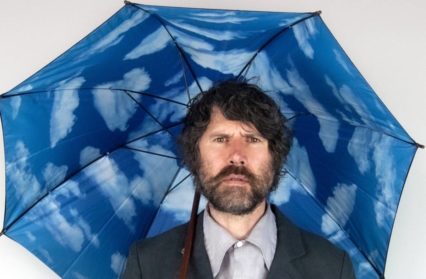Max Ashworth reviews the latest Welsh-language solo album from the Super Furry Animal frontman, Pang! by Gruff Rhys.
Gruff Rhys, solo artist, composer, sometime lead vocalist with the Super Furry Animals, producer, film-maker, author, Godfather of Cool Cymru and “the most creative man in Wales” remains gleefully uncategorisable, and Pang! is no different, an album saturated with South African sounds and rhythms, and reined in from the magnificent Babelsberg. That full orchestration is pared back to brass and woodwind, nicely interplayed folky guitar and drums, and sung entirely in Welsh and Zulu, and a running time coming in at an almost EP length of 30 minutes, Pang! will delight fans but bemuse newcomers. Despite an urgency one may expect from an album of three minute songs, this is a contemplative album, so laid back I’m surprised the album didn’t fall asleep.
The album cover gives nothing away, maybe evoking Esher and Magritte, and the confusingly arranged liner notes imply the surface of abstract impressionism. Obfuscation at least. But worry not. It’s been a while since the last SFA output, but Gruff has been forging a highly successful solo career, and this album is no exception. Produced at Splice, in Cardiff and Johannesburg, South Africa with electronica artist and beat maestro, Muzi.
Even though the guitar sometimes sounds kind of like Leonard Cohen or Devendra Banhart or Jeffrey Lewis, the left-handed playing of an upside down right-hand guitar (like Jimi Hendrix, except Jimi re-strung the guitar accordingly) makes Gruff’s playing almost inimitable. Rather than learning to play the guitar, it’s like he’s teaching the guitar how it should be played. The guitar is suddenly the beginner. And this anarchic approach to the guitar is perfectly in keeping with Rhys’s uncompromised cultural and political vision. Starting out musically as a drummer, you wonder what idiosyncratic approach he brought to percussion.
The finger-picked guitar is constantly present but unobtrusive. Pang! is warm and layered, no instrument predominates, even Rhys’s voice when he sings a capella; the album is restrained and contained, tight and captive, but capable, hinting, of some wildness, like a sleeping lion on safari.
Not being a Welsh speaker I approached this album with Rhys’s vocal as another instrument carrying the main melody. It’s no hurdle, and I’m sure the words matter a lot to Welsh (and Zulu) speakers and demonstrate further Rhys’s clever and playfully ironic word play, but very little to me, alas. Google translate does not do justice to Rhys’s sometimes wilfully obscure vocabulary, and I only used it to get a grip on the main themes. Furthermore, “Pang!” the single was dropped online on the 10th July and received likes and favourable comments on streaming sites from fans in Europe, Africa and America and beyond. They don’t see a hurdle, and instead demand Rhys tour in Croatia.
Pang! is an unexpected collection of ideas that grew into an album saturated with yearning, longing, a folk reel listing various reasons for pangs: hunger, regret, pain, and containing Rhys’s political concerns, distrust of authority (Ol Bys/Nodau Clust), climate change (Eli Haul), fake news (Niwl O Anwiredd), globalisation (Digidigol), and his championing of the Welsh language. “Singing in Welsh is a political act,” says Gruff, “because it’s a minority language in danger of dying unless political action is taken.”
Pang! contains delicious, repetitious beats, rising and swelling with Gruff Rhys’s lilting voice, and the clever interplay between the brass section of Gavin Fitzjohn and percussionist Kliph Scurlock who, given his continent’s musical heritage, might even have got away with some Ginger Baker stuff, but is very restrained here. At 30 minutes, this album will leave you yearning for more – a pang, maybe – but the good news is Gruff is touring to promote the new album and will be performing in Wales on 21/9/19, in Bangor, Neuadd Ogwen, and also at Cardiff Swn Festival on 18/10/19.
Max Ashworth is a regular Wales Arts Review contributor.











